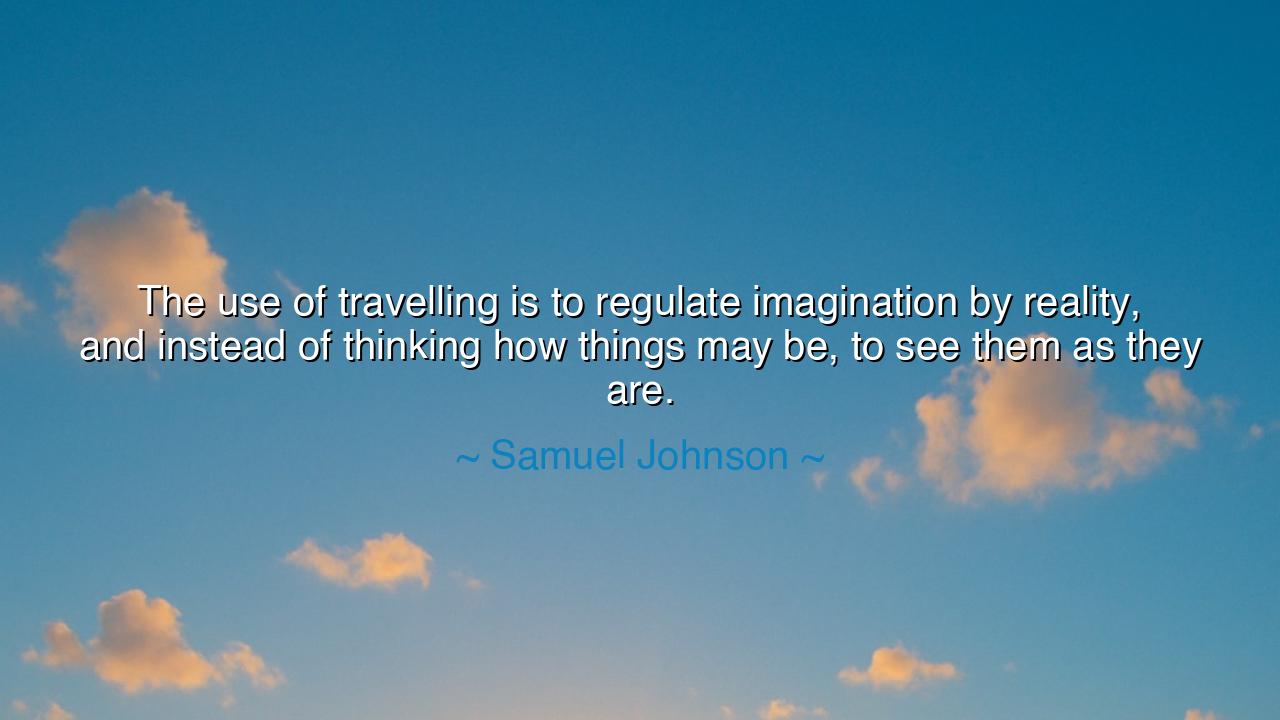
The use of travelling is to regulate imagination by reality, and
The use of travelling is to regulate imagination by reality, and instead of thinking how things may be, to see them as they are.






“The use of travelling is to regulate imagination by reality, and instead of thinking how things may be, to see them as they are.” Thus spoke Samuel Johnson, the great moralist and thinker of the English Enlightenment, whose words burned with both reason and reverence for truth. In this profound reflection, he teaches that the purpose of travel is not mere pleasure, nor escape, nor the gathering of exotic stories, but the discipline of the imagination. For the mind, left to its own devices, creates false worlds—castles in the air built upon ignorance and fantasy. The traveler’s journey, then, is a sacred act of correction: a meeting of imagination with reality, so that vision becomes truth, and dreams find their rightful ground in the world as it truly is.
The origin of this quote lies in Johnson’s own life and philosophy. He was a man of great intellect and restless curiosity, who lived in an age when the world was expanding—new continents were being mapped, new peoples encountered, and the horizons of knowledge were stretching beyond imagination. Yet Johnson, though not a great traveler himself, understood the spiritual and moral value of journeying. In his Journey to the Western Islands of Scotland, written after traveling with his friend James Boswell, he observed how the landscapes and people of Scotland—so different from the England he knew—challenged his assumptions and humbled his intellect. He learned that truth cannot be fully known from books or dreams, but must be seen, felt, and lived. Thus he concluded that the true use of travel is to regulate imagination by reality—to temper the visions of the mind with the witness of the eyes.
In these words, Johnson warns against the dangers of living too long within the realm of imagination alone. The mind, when untested, tends toward illusion; it creates images of how the world should be, rather than how it is. We dream of distant lands, noble peoples, or perfect lives, and in doing so, we make idols of our expectations. But when we travel, when we step beyond the comfort of the familiar, our illusions are shattered—and in their place, we gain wisdom. To see things as they are is not to lose wonder, but to deepen it. Reality, once met face to face, becomes more marvelous than any fantasy the idle mind could invent.
Consider the story of Marco Polo, who journeyed from Venice to the courts of Kublai Khan. Before he left, Europe imagined the East as a land of monsters and miracles—filled with fables more than facts. But Polo, through years of perilous travel, replaced imagination with reality. His writings brought back not myths, but the vivid truth of a great civilization: its cities, its riches, its laws, its wisdom. He regulated imagination by reality, and in doing so, expanded the world’s understanding. Yet he did not lose his sense of wonder—indeed, his reality was more astonishing than the myths he had once heard. This is the traveler’s paradox: that the truth of the world, when seen, is more miraculous than the fantasies of the mind.
Travel, in Johnson’s sense, is not merely a movement across geography, but a pilgrimage of perception. It is the journey that tests the dream against the ground. When we travel—whether across lands or into the hearts of others—we confront what is real, what is imperfect, what is human. We learn humility. We discover that our imagination, though bright, is incomplete; that the earth is not as we imagined it, but richer, rougher, more divine. To see things “as they are” is not to strip the world of beauty, but to see its beauty through the lens of truth. It is to love the world not for what we wish it to be, but for what it truly is—a reflection of both majesty and frailty.
Johnson’s wisdom reaches beyond the act of travelling. It is a call to all who seek knowledge, love, or faith. For in every realm of life, we are tempted to live by imagination alone—to believe in perfect people, perfect systems, perfect destinies. But only by engaging with reality—by listening, observing, struggling, and seeing—do we mature. The philosopher who never leaves his study, the lover who never faces the beloved’s faults, the believer who never questions—all live in half-light. To truly live is to journey, to let reality refine one’s dreams, to let the world’s truth correct one’s vision without extinguishing it.
O seeker of truth, take this teaching to heart: let your imagination soar, but let reality be its anchor. Dream greatly, but do not worship the dream. Go forth into the world—not to escape your life, but to enlarge it. Look upon people, places, and moments with clear eyes. Learn to love the world as it is, for only then can you help make it better. The true traveler does not abandon imagination, but perfects it—he learns that wonder is not found in fantasies of faraway lands, but in the real earth beneath his feet, alive with mystery. As Samuel Johnson teaches, the highest use of travel—and indeed of all human striving—is this: to let imagination and reality walk hand in hand, until the dreamer becomes not blind, but awakened.






AAdministratorAdministrator
Welcome, honored guests. Please leave a comment, we will respond soon